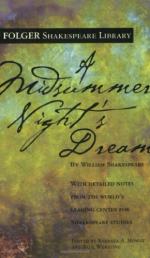|
|
A Midsummer Night's Dream Objects/Places
Athens: Athens is the location that opens and ends the play. It is the world of the mortals, the non-fantastical, non-magical. Theseus, Hippolyta, and Egeus all remain in Athens, while the four Athenian lovers venture to the woods, where they begin their magical journey of fairies and flower juice, and altered sentiments.
The Woods: The woods encompass the middle three acts and bulk of action for the play. It is a world where fairies reign, magic is ubiquitous, and fantasy is reality. Titania and Oberon live there and simply move from one portion to another. Puck flies around to different parts, causing trouble, and Hermia and Lysander run into it for safety of their love. It is here that all of the magical events take place. People fall in and out of love, they curse, and fight in the realms of the woods. They also eventually make amends and create harmony and bliss for everyone in the woods.
Quince’s house: Quince’s house is in Athens, but is the antithesis of Theseus’s palace. It represents the lower class and the commoners. It is also the locale of much of the rehearsals for Pyramus and Thisbe, for Quince is a carpenter and also the director of the mini-play.
Pyramus and Thisbe: This is the play that the commoners put on for Theseus and Hippolyta. It is an old and famous tragic love story that ends in death for both hero and heroine.
Magic Flower: This flower is the master of magic for the love-confusion in the woods. It originates from 'where the bold of Cupid fell:/ It fell upon a little western flower,/ Before milk-white, now purple with love’s wound,/ And maidens call it love-in-idleness' (Act 2, Scene 1, lines 165-169). When placed on the sleeping eyelids of a man or woman, it will cause him or her to fall in love with the next live creature that he or she sees. The juice from this flower is the machinery by which all the lovers are confused and is also the machinery by which everything is mended.
The Wall: Snout assumes the role of 'the wall' in their production of Pyramus and Thisbe at Theseus’s palace. He, as the wall, divides the lovers, Pyramus (Bottom) and Thisbe (Flute) from seeing one another.
Donkey Head: Bottom’s human head is transformed into a donkey’s head while practicing in the woods. He frightens his friends away and is completely oblivious to this change. When Titania awakes, she sees Bottom as the ass and falls in love.
Lion: Snug's role in the Pyramus and Thisbe. He roars onto the stage.
Moonshine: Starveling assumes the role of 'moonshine' in the production. He says nothing and represents the light of the moon in Pyramus and Thisbe. However, moonshine is the main light that the Athenians have the woods that summer evening, as well.
India: The little page, the Indian boy, is from India. This region of the world is mentioned several times in the play regarding magical, mystical events. Titania met her friend (the boy’s mother there) and the magic flower is from India, as well.




